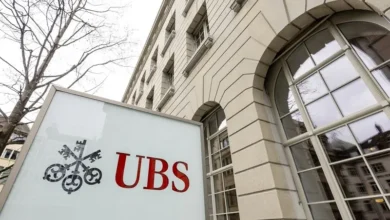UBS agrees to buy Credit Suisse in Swiss-assisted bid to calm markets

UBS agreed to buy rival Swiss bank Credit Suisse for 3 billion Swiss francs ($3.23 billion) and agreed to assume up to $5.4 billion in losses, in a shotgun merger engineered by Swiss authorities to avoid further market-shaking turmoil in global banking.
Swiss regulators have been forced to step in and orchestrate a deal to prevent a crisis of confidence in Credit Suisse spilling over into the broader financial system. The deal is expected to close by the end of 2023.
The Swiss finance minister said the bankruptcy of a globally important bank would have created irreparable consequences for financial markets.
It was not yet clear if the deal is enough to restore trust in lenders around the world. The first indication could come when stock markets open in a few hours in Asia, Australia and New Zealand.
The Swiss central bank will supply substantial liquidity to the merged bank, it said at a news conference in the Swiss capital, Bern. It said the deal includes 100 billion Swiss francs ($108 billion) in liquidity assistance for UBS and Credit Suisse.
“With the takeover of Credit Suisse by UBS, a solution has been found to secure financial stability and protect the Swiss economy in this exceptional situation,” the Swiss central bank said.
The effect on jobs was not immediately clear. UBS said it expected annual cost savings of some $7 billion by 2027. Credit Suisse shareholders will receive 1 UBS share for every 22.48 Credit Suisse shares held, equivalent to 0.76 Swiss francs per share for a total consideration of 3 billion francs, UBS said.
The Swiss Financial Market Supervisory Authority (FINMA) said it will be possible to continue all the business activities of both banks with no restrictions or interruptions. FINMA said it will coordinate with national and international authorities, namely the US Federal Reserve and the British Prudential Regulation Authority.
Credit Suisse Additional Tier 1 shares with a nominal value of around 16 billion Swiss francs ($17.2 billion) will be written down completely after the Swiss government provided support, the Swiss regulator said.
Officials have been racing to rescue the 167-year-old bank, among the world’s largest wealth managers, after a brutal week saw the second- and third-largest US bank failures in history. As one of 30 global banks seen as systemically important, a deal for Credit Suisse could ripple through global financial markets.
At least two major banks in Europe are examining scenarios of contagion possibly spreading in the region’s banking sector and looking to the Federal Reserve and the European Central Bank to step in with stronger signals of support, two senior executives with knowledge of the discussions said.
The weekend negotiations follow efforts in Europe and the US to support the sector since the collapse of US lenders Silicon Valley Bank and Signature Bank. US President Joe Biden’s administration moved to backstop consumer deposits while the Swiss central bank lent billions to Credit Suisse to stabilize its balance sheet.
The fallout from the crisis of confidence in Credit Suisse and the failure of the two US banks could ripple through the financial system this week, the two executives separately told Reuters on Sunday.
Credit Suisse shares lost a quarter of their value last week. The bank was forced to tap $54 billion in central bank funding as it tries to recover from scandals that have undermined the confidence of investors and clients.
Swiss authorities are examining imposing losses on Credit Suisse bondholders as part of a rescue of the bank, two sources with knowledge of the matter said on Sunday.
However, European regulators are apprehensive about such a move for fear that it could hit investor confidence elsewhere in Europe’s financial sector, the sources said, speaking on the condition of anonymity.
US authorities are working with their Swiss counterparts to help broker a deal, Bloomberg reported, while Sky News said the Bank of England has indicated to international counterparts and to UBS that it would back the proposed takeover of Credit Suisse, which counts Britain as a key market.
The two banks’ fortunes have diverged sharply over the past year. UBS earned $7.6 billion in profit in 2022, while Credit Suisse lost $7.9 billion. Credit Suisse’s shares are down 74 percent from a year ago, while UBS’s are relatively flat.










